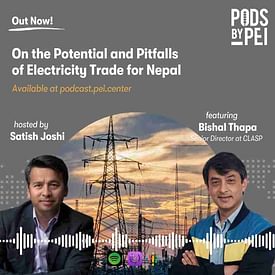Ep. Co#002
For over half a century, Nepal has deeply held on to the established narrative of its immense hydropower potential. Proponents have long proclaimed hydropower as a source of clean and affordable energy and a means of achieving national prosperity through the export of electricity to markets in India and beyond. In reality, however, the country has realized only a fraction of its potential and the chronic power shortage has had a huge economic cost.
Today, Nepal has emerged from its decade of darkness, primarily by being able to import electricity from India. But Nepal is also on its path towards producing "surplus" electricity and is now, finally, beginning to trade in the Indian electricity market. Despite this positive outlook, however, systemic challenges of access, quality, and reliability remain unresolved.
In this episode of Conversations, the two speakers look into the past, the present, and the future of Nepal’s electricity sector narrative. This episode features PEI’s own Saumitra Neupane and our guest Satish Joshi from VRock & Company, who has worked in Nepal’s electricity sector for over a decade on issues ranging from institutional reforms to electricity trade. It will begin by dissecting the formation of Nepal’s hydro-centric energy narrative, the reasons behind the country’s failure to exploit the stated hydropower potential, and the impact that has had on Nepal’s energy sector and the overall economy. Putting all this in the context of the current global energy transition, we discuss a new narrative that is grounded on the concept of energy security and based on increased domestic consumption and efficient electricity trade with India.




